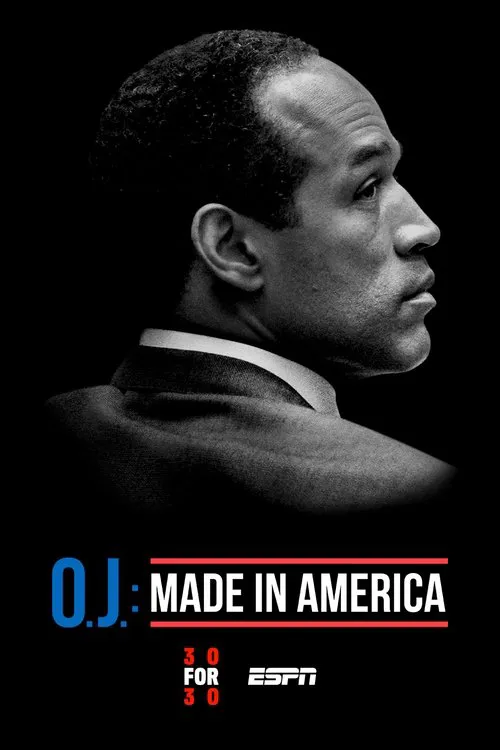O.J.: Made in America

Plot
O.J.: Made in America is a seven-and-a-half-hour documentary film directed by Ezra Edelman, released in 2016. The film chronicles the rise and fall of former American football player and actor Orenthal James "O.J." Simpson, whose highly publicized murder trial exposed the deep-seated racial tensions simmering beneath the surface of American society. The film delves into the complexities of Simpson's life, from his childhood in the Watts neighborhood of Los Angeles, California, to his subsequent rise as a football star and Hollywood actor, culminating in the infamous "Trial of the Century." The film begins by examining O.J. Simpson's childhood, a time marked by poverty and racism. Born in 1947, Simpson's early years were shaped by growing up in a neighborhood plagued by gang violence and racial tensions. His father, a janitor, was not present in the household, and Simpson's mother, a devout Christian, instilled in him a strong sense of self-worth and a desire for success. The young Simpson found solace in sports, particularly football, which would become his ticket out of poverty and into the mainstream American consciousness. As Simpson's football career took off, so did his fame. He was drafted by the San Francisco 49ers in 1969 and went on to star for several years, earning a reputation as one of the greatest running backs in the history of the game. Simpson's success on the field translated into commercial success off the field, as he appeared in numerous commercials and eventually transitioned into a successful acting career. The film's second act focuses on Simpson's personal life, highlighting his lavish spending habits and his high-profile relationships. In 1985, Simpson married Nicole Brown, a beautiful and vibrant young woman who was also a member of the same social circle as several of Hollywood's most prominent stars. The couple's marriage was marked by turmoil and violence, with several reported incidents of Simpson's abuse. In June 1994, Nicole Brown Simpson was found brutally murdered outside her home in Brentwood, California. Her ex-husband, O.J. Simpson, was immediately suspect, and a massive manhunt ensued. As police collected evidence and pieced together the events of that fateful night, Simpson's popularity and reputation began to unravel. The film's third and final act chronicles the highly publicized trial of O.J. Simpson, which captivated the nation and exposed the country's deep-seated racial tensions. African-American Americans and whites rallied behind Simpson, with many in the African-American community viewing him as a symbol of hope and a victim of racism. Meanwhile, many whites saw Simpson as a privileged and entitled individual who had used his fame and resources to avoid accountability. The trial itself was a spectacle, with high-profile attorneys and celebrity witnesses dominating the headlines. The prosecution, led by Marcia Clark and Christopher Darden, presented a wealth of evidence, including DNA analysis and eyewitness testimony. However, the defense team, led by Robert Shapiro, Robert Kawecki, F. Lee Bailey and Alan Dershowitz successfully challenged much of the evidence, raising questions about the reliability of the forensic analysis and the credibility of the key witnesses. In a stunning conclusion, the jury delivered a verdict of "not guilty," acquitting Simpson of the murders of Nicole Brown Simpson and her friend, Ron Goldman. The reaction was explosive, with many in the African-American community rejoicing in the verdict and others viewing it as a miscarriage of justice. The film concludes by examining the aftermath of the trial and the lasting impact of the Simpson case on American society. As Edelman notes, the trial exposed the deep-seated racial tensions that have long plagued the United States. For many African-Americans, the verdict was seen as a victory, a reminder that justice can be elusive for those who are perceived as being "less than." For many whites, the verdict was a symbol of the perceived leniency of the justice system. In the end, O.J.: Made in America is a powerful and thought-provoking film that offers a nuanced and complex exploration of the rise and fall of O.J. Simpson. While the film is often described as a documentary, it is more accurately seen as a narrative that combines elements of history, biography, and social commentary. Edelman's masterful direction and the film's meticulous research make it an essential work for anyone seeking to understand the complexities of American society and the enduring legacy of one of the most infamous crimes in modern history.
Reviews
Recommendations




